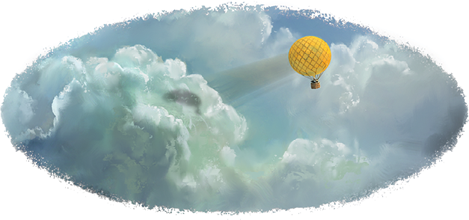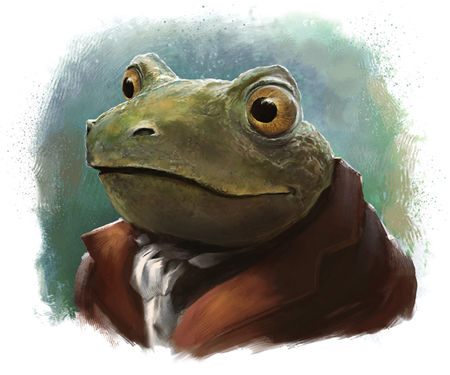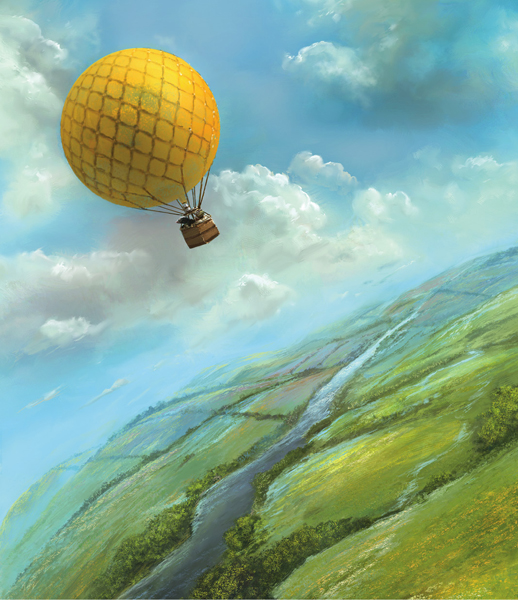
CHAPTER TWO
The Wild Blue Yonder

In which one of our heroes achieves his heart’s desire. And then wishes he hadn’t.
Perhaps it was the stimulating effect of the flourishing season, or possibly the rankling remark made by the Swift about ground grubbers, but whatever the cause, the Mole was a changed animal. He found himself unable to concentrate on much of anything other than the brilliant balloon. What must it be like to glide on high with the birds and the clouds? In short, why should swifts (and toads) have all the fun?
With this in mind, the Mole trotted to Toad Hall one bright afternoon and found the owner on the great velvety expanse of lawn with his balloon almost fully inflated. The Mole caught his breath at the magnificence of it.
“Hullo, Moly,” Toad called out. “I’m just about to take off. Come along with me. There’s absolutely nothing like it! The fresh air! The grand views! When I think of all the time I squandered on trivial pursuits such as boating, I’m almost reduced to tears. Why would anyone choose to spend his time floating on the River when he could spend it sailing in the Air? And as for motoring? Pah!”
“Well, I…” Mole found himself suddenly tongue-tied, now that his dearest wish was about to be realized.
“Oh, do come along, Mole, it’s perfectly safe with an experienced balloonist like myself at the helm. Why, I’ve been doing it for days now. Absolutely nothing to it. Jump aboard, Mole, there’s a good chap.” He added, “Cook packed me a first-rate lunch. There’s plenty.”
“All right,” said Mole shyly.
“Good man! That’s the spirit! Just let me check the wind gauge, and we’ll be on our way in a tick.”
Mole clambered into the basket, which creaked alarmingly, even more so when Toad joined him.
Mole said nervously, “Are you sure it will hold us both?”
“’Course it will. It’s the best model on offer.” Toad fiddled with the valves, and the coal gas flared up with a mighty whoosh.
“Toad!” cried Mole, recoiling in horror. “It’s on fire!”
“’Course it’s on fire. It’s supposed to be on fire. You burn the gas, and that makes the air hot, and that’s what goes into the balloon, and that’s what lifts it all up. At least, I think that’s how it works. Silly me, I never can keep it straight.”
With no further preamble, the balloon, the basket, and its inhabitants sprang from the earth. The Mole gasped in terror and clutched the rim of the basket as the ground receded beneath them at a horrifying clip. His instincts screamed that he’d made a dreadful mistake, that it was all so terribly wrong. That the proper situation for a mole—the only situation for a mole—was to remain firmly affixed to the earth or, better yet, under the earth in his own familiar burrow. What had he been thinking? He sank to the bottom of the basket and cowered there, his stomach heaving.
“Mole, old thing, whatever’s the matter?” said Toad. “You’re missing the view.”
Mole moaned, his face hidden in his paws, “Take me home, Toad. Oh, please, take me home.”
“Don’t be ridiculous, we’ve only just started. We won’t be home for hours yet. Here, stand up and look at the Hall. There’s the orchard, and there’s the croquet lawn, and there’s the boathouse. Oh, and look, there’s Cook in the kitchen garden, waving her tea towel at us. Hullooo!” Toad waved vigorously, causing the basket to sway and the Mole to gulp. “Stand up and take a look, Mole. Hullooo!”
Mole pleaded, “Oh, Toad, you’ve got to steer it back.”
“Steer it, did you say? Don’t be absurd, there’s no steering it, old thing. No, no, not at all. That’s part of the charm, old fellow, part of the adventure. To sail wherever the currents take one. To surrender one’s course to the vagaries of the wind. Why,” Toad chuckled, “I s’pose that’s where the phrase ‘to throw caution to the wind’ comes from. I’ve never thought of that before. Have you ever considered that, Mole?”

There was no answer.
“Moly?”
There was still no answer.
“What are you doing down there,” inquired Toad, “all curled up like a hedgehog?”
“I want to go home,” murmured the pitiful Mole. “I want my own little burrow, even if it is just a hole in the ground. I want to dig and tunnel and rummage about in the earth. The Swift was right. It’s what a mole does, Toad. It’s simply not natural for moles to fly.”
“Stuff and nonsense,” Toad protested. “By your reasoning, it’s not natural for toads to fly either, but look at me. Here I am. Free as the proverbial bird on the wing. I must say, you disappoint me, Mole. I never took you for such an old fuddy-duddy. Where’s your sense of adventure? I, Toad, crave the Life Adventurous. Oh, look, there’s the village and the church. And there’s a flock of sheep grazing on the commons. They look like balls of cotton from here. And, look, there’s the River.” Toad prattled on and pretended not to notice Mole bundled in his misery.
“I say,” exclaimed Toad. “I wonder if that’s the meadow where your burrow is. It’s rather hard to tell from here.”
Mole uncurled himself at these tantalizing words.
Toad went on. “Shame that I can’t tell for certain. Ah, well. It’s too bad you’re missing this once-in-a-lifetime opportunity, Moly.”
The Mole cautiously raised his head.
Toad continued, “It’s not every day that one gets to see one’s home from such a lofty perspective. Ah, well.”
Mole spoke in a small voice. “D’you really think it might be my meadow?”
“Difficult to say. I imagine that only someone familiar with the area could tell. I can take us down a bit lower, for although you can’t, technically speaking, steer the aircraft, you can make it go up or down easily enough.”
The Mole squeezed his eyes shut, gripped the side of the basket, and slowly pulled himself to a standing position, trying hard not to jiggle the aircraft. Right, Moly, he told himself sternly, you can do this. He willed himself to look.
Below him, as far as the eye could see, lay the overwhelming panorama of the wide world: meadows of barley neatly divided by the darker lines of hedges and roads, an undulating checkerboard of emerald green and lime green and pale gold. Dotted across the pastoral landscape were charming hamlets, including their own familiar village of Toadsworth, punctuated by the steeples of picturesque churches. The Mole was entranced. He exclaimed, “Oh, my!” and would have clapped his paws together in excitement, except that doing so would have meant releasing his hold on the basket.
He contemplated the countryside in awe. In the distance lay the Wild Wood, lowering and sullen, even in full daylight. And there flowed the River, snaking its way through the scenery, shining like a mirror at the turns where it caught the sun. Mole was agog, which gratified his host no end.
“Isn’t it grand?” proclaimed Toad. “I’m not the sort to say I told you so, but I did tell you so.3 There’s absolutely nothing like it. Here, let’s drop down and see if it’s your meadow.” He pulled on the release valve.
They sank slowly until Mole could see that the countryside was imprinted with a crazed web of dozens of narrow crisscrossing trails, along which many miniature gray shapes darted. Mole squinted, and the darting gray shapes turned into rabbits.
“I think it’s my meadow,” he said doubtfully. “It’s all so different from up here. If only I could pick out a landmark.”
A bird careered by and called out a greeting to Toad. Catching sight of the Mole, it uttered a squawk of disbelief. It was the very same Swift of earlier acquaintance. He landed on the rim of the basket and affixed the Mole with a beady gaze.

“I don’t believe it!” he said. “You there, Mole, you are a creature out of place. It’s most unnatural, this business. First the water, now the air. I shall have to report you to … to the authorities.”
“Oh?” retorted Mole cheekily. “And who might that be?”
The Swift struggled with this and finally said, “Surely there’s a … a bureau of something or other I can complain to. And you, Toad, I’m surprised at you for encouraging this sort of behavior in others. Bad enough that you’re up here where you don’t belong.”
“Bilge,” declared Toad. “And if you’re going to ride with us, at least be polite about it. Otherwise, be off with you.”
Once again Mole’s brain hummed feverishly to produce a clever reply, but once again the Swift was gone before he could deliver up some sizzling repartee. (Just as well, for not all rudeness needs to be returned, measure for measure. Sometimes one just has to take the high road of good behavior, even if one is elbowed onto that path by the bad behavior of others.)
“Oh, look!” Mole cried, and pointed at a tiny boat on the River with an even tinier figure plying the oars. “Could that be Ratty? Hullooo, Ratty!” he called, but the figure took no notice. “Up here!” He momentarily forgot himself and waved vigorously, which sent the basket jig-jogging sideways. He grabbed the rim in a panic. And then, after taking a few deep steadying breaths, he let go again. He surveyed the world below him, and thought … Yes.
Yes, there was something to this ballooning business after all, with the fresh air in one’s face, and the ripple of the bellying silk, and the faint creak of the basket. Yes. He raised his snout to taste the breeze and was shocked and enchanted to find alluring clues to a thousand and one tales unknown to him, whole volumes of information he’d never read before. There—yes, just there—came the faintest fragrance of strange wildflowers; from over there wafted the damp piney smell of unexplored forests; from there, the intriguing smell of murky marshes teeming with exotic life. And there was a hint of something else tickling his nose. Something briny that he’d never smelled before. Why should the air smell of salt? What could it be?
Mole sniffed deeply and pondered this thrilling question while Toad investigated the contents of the luncheon basket. Our aeronauts’ attention was not focused on their course as closely as it should have been, so that neither one of them noticed they were drifting toward Toadsworth at a lower-than-recommended altitude.
The bewitched Mole said, “What is that smell, Toad, the one far off in the distance? That odd, particular smell that’s … well … like salt?”
Toad paid him no attention. He was busy pawing through various wax-paper parcels and working himself into a snit. “Oh, drat,” he grumbled peevishly. “Cook forgot to pack me a bottle of black currant cordial. What a bother. She knows it’s my favorite. I’ll have to speak to her about it.”
“But that smell,” Mole went on. “Why should the air smell like pickling brine?”
“Oh, here it is,” said Toad, extracting a bottle swathed in straw. “Hmm? Oh, they tell me that’s the Ocean, although I’ve never seen it.”
“So that’s the Ocean,” said Mole in wonder. “I’ve read about it in books. They say it’s a place where all the water in the world ends up, every stream and lake, every drop of rain. Do you think that includes our own River?”
“I s’pose,” said Toad, unwrapping a packet of sandwiches. “Dig in, old thing.”
Mole stared into the distance and said, “I wonder what it looks like, this Ocean?”
“They tell me it’s huge. Water as far as the eye can see. And big waves, enormous waves. And terrible tides, and p’tickly nasty weather.”
“Oh,” said Mole diffidently, “but it does smell so very interesting. I think I’d like to see it one day, just for a little while. Could we get there by balloon, d’you think?” For Mole, having overcome his initial fear, had decided that ballooning was quite the way to go.
“Not really a place for Riverbankers,” said Toad. “I say, do you want the cheese or the roast bee—”
His words were interrupted by a tremendous thump and a hair-raising screech, followed by the appalling sight of some kind of harpoon thrusting its way upward through the bottom of the basket.
“What’s happening? What’s happening?” yelled Toad.
The Mole danced out of the way of the sharp metal point as it rose between them until it loomed over their heads.
“What is it?” cried Toad.
The Mole took a tentative step closer and examined the strange object which had so ignominiously impaled their airship. “Oh, no,” he moaned. “We’ve come down on the steeple.”